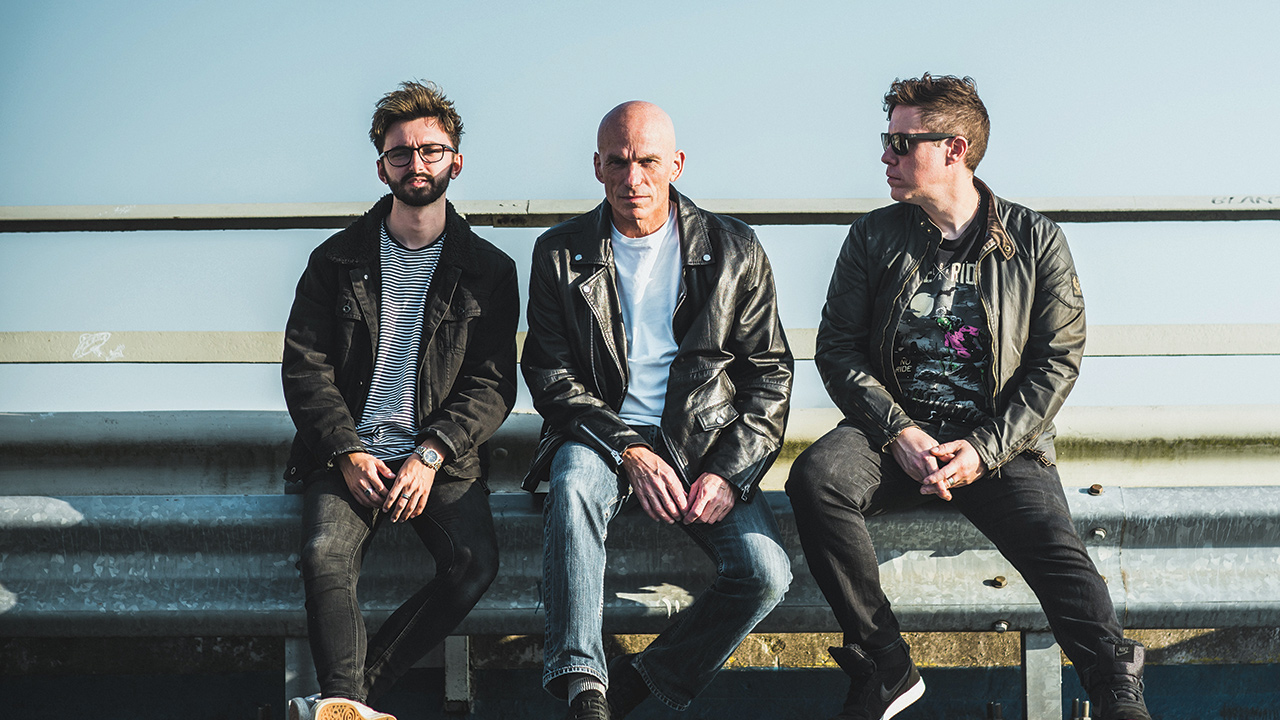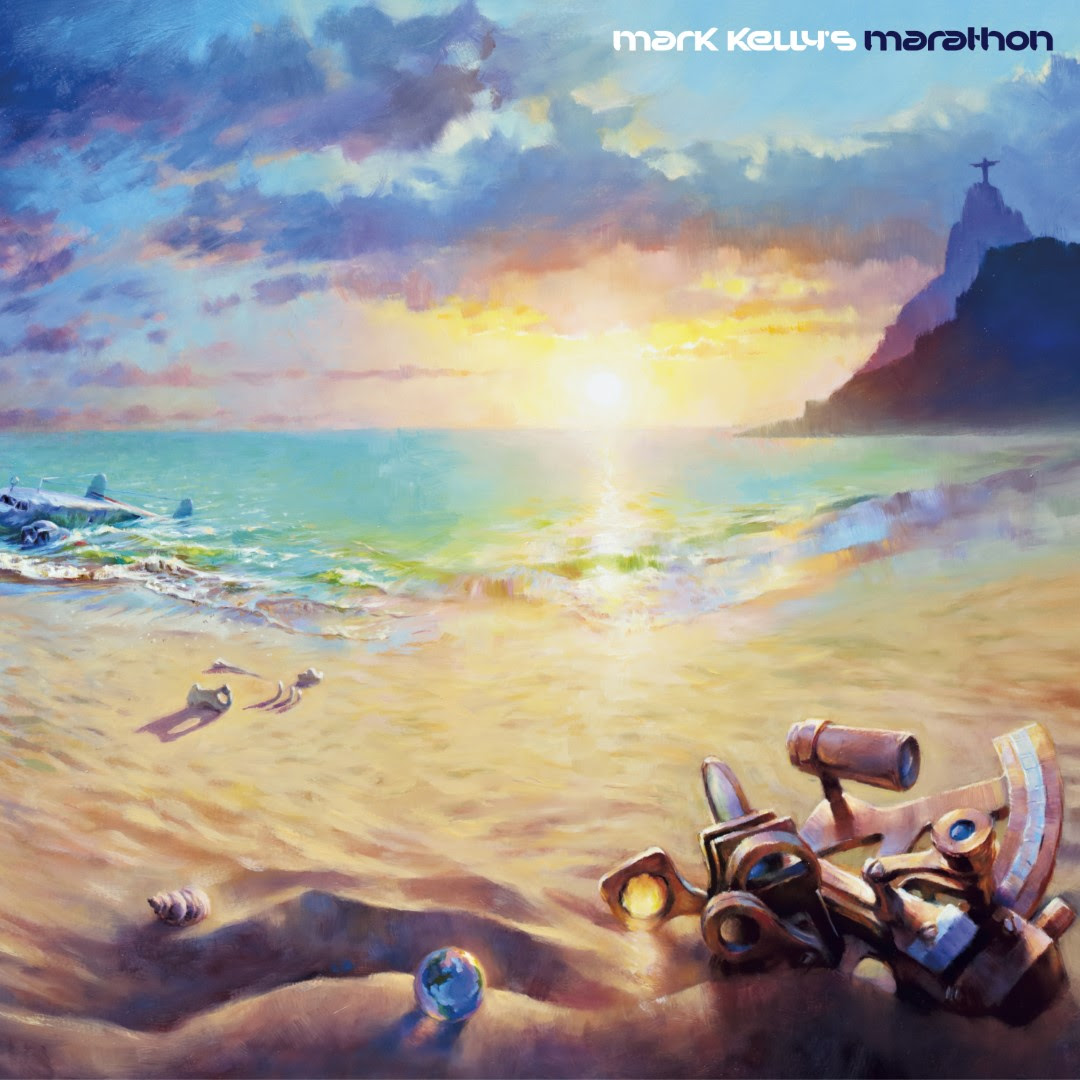
Marillion’s Mark Kelly took a circuitous route to releasing his first solo album, Mark Kelly’s Marathon back in 2020. Prog found out how the keyboardist’s new project came about and learnt the story behind those Wakeman-esque solos.
Consider, to name but three, Genesis, Yes and Pink Floyd. For members of certain bands occupying the upper echelons of progressive rock, it was standard operating procedure to intersperse solo albums with group releases at suitable points. Despite their myriad successes over the last four decades-plus, Marillion may not sit exactly alongside the aforementioned triumvirate, but they don’t fall far short.
Vocalist Steve Hogarth, guitarist Steve Rothery and bassist Pete Trewavas have all pursued extracurricular endeavours beyond Marillion, with Hogarth releasing his Ice Cream Genius album as far back as 1997 and Trewavas arguably having attained greatest acclaim outside Marillion through his membership of prog supergroup Transatlantic since 1999. By contrast, talk of keyboardist Mark Kelly pursuing a solo career has bubbled sporadically for over a quarter of a century but with no significant output.
“It was my own fault really,” Kelly says of expectations that were raised long ago but are only now being met. “I got caught up with the idea of joining the solo album brigade and for years people would ask me about it.”
Back in the last millennium, Kelly did formulate an initial solo album plan. “I thought I’d follow in the footsteps of Rick Wakeman, pick a theme and do an instrumental album.” He alighted on Dante’s Inferno, from Divine Comedy, as said theme before hitting a significant stumbling block.
“I never really got past the early stages; my heart wasn’t in it, to be honest. I remember sending a recording to Steven Wilson in the very early days of Porcupine Tree to see if he was interested in some sort of collaboration or getting involved. I never heard back from him, so he obviously wasn’t impressed! I spoke to him recently and mentioned the solo album and he said, ‘Is that the same solo album you were talking about doing 25 years ago?’ So he hadn’t forgotten!”

In the intervening period, Kelly has made a handful of guest appearances with DeeExpus and Trewavas’ Edison’s Children as well as producing an album for Jump (1995’s The Myth Of Independence) and “moonlighting for Travis for some festivals one year”. But Marillion has clearly remained his core focus. “There was always something more demanding on my time than a solo album which there was no deadline for,” he readily admits.
There the solo album topic rested, until Kelly’s friend Guy Vickers revealed himself to be a lyricist. In 2012 Kelly recorded some jams with bassist Steve Lawson and former Fairground Attraction drummer Roy Dodds. But this ultimately proved to be another false start. “I gave the jams to Guy to see if he could come up with some lyrics, which he did. But the music wasn’t really doing it for me.”
With Dante’s Inferno consigned to ancient history and the 2012 jams having led nowhere, Kelly concluded that he needed to focus on a song-based solo album. With Vickers’ continuing cajoling, Kelly eventually gave his friend some more music, including some ideas originally conceived by the keyboardist under the auspices of Marillion.
“In Marillion we jam a lot and have over 1,000 ideas that have never been used. Some are short, some are longish, but there’s lots that I know that Marillion wouldn’t use. Some of those ideas were my starting point, which I gave to Guy and he started working on lyrics.”
This resulted in the writing of Amelia and Twenty Fifty One, the two longer tracks that bookend Mark Kelly’s Marathon, at which point Kelly recruited his now 23-year-old guitarist/bassist nephew Conal Kelly to work alongside him. The nascent band still lacked a key component however, namely a vocalist.
“A year or two went by with me looking for a singer, but not really having enough time to devote to it. Then I mentioned in a Marillion fan club interview that I was looking for someone and that a Peter Gabriel-type voice would work.” Another friend of Kelly’s promptly recommended Oliver M Smith.
“I contacted Ollie, sent him the music and lyrics for Amelia and didn’t hear back from him for about a month. Because he was used to working in a three-minute pop song format apparently he was looking at it thinking, ‘What the hell am I going to do with this?!’”
But when Kelly eventually received Smith’s ideas for Amelia he knew he’d found his singer. “He had done a load of vocal melodies with harmonies that were really good and very professional considering it was done at home.”
With a vocalist secured, Kelly could now see his solo album finally taking shape. But the small matter of actually recording it properly was still unresolved. In the summer of 2019, Kelly and his cohorts spent a couple of days in Marillion’s Buckinghamshire studio recording demos but proceeded no further. However, with coronavirus temporarily suspending work on the next Marillion studio album, lockdown presented Kelly with a window of opportunity to progress the album.
Fortuitously, drummer Henry Rogers, with whom Kelly had crossed paths during his brief stint with DeeExpus, had built a home studio shortly prior to lockdown. “So I said that everybody should just record their parts at home, send them to me and that I would put it all together and see what I could do in the next two or three months. I literally did the album on a Mac mini with one or two keyboards and everyone else worked pretty much the same way. Drums would have been probably the main hurdle around doing it at home; you can’t really record drums in a bedroom.”
The collective efforts of Kelly and his band – completed by guitarists Pete Wood and John Cordy – have yielded a supremely melodic album. Musically, perhaps unsurprisingly, it’s frequently not far removed from Hogarth-era Marillion. But it’s also a highly accessible album. Indeed for those who may have found Marillion’s last studio album, FEAR, heavy going and overlong, Kelly’s solo effort provides a panacea. But is Mark Kelly’s Marathon a solo album or not?
“The album is called Mark Kelly’s Marathon but the band is called Marathon. I wanted the band to have its own identity,” he states. “I haven’t got that much profile as the keyboard player in Marillion, but it’s better than none. People call these albums ‘solo albums’, but this is a very creative collaboration. I wouldn’t call myself the benign dictator, but I am the one that has the final say and decides the direction in which songs should go.”
Not unreasonably, Kelly’s own keyboards feature prominently but not overwhelmingly. “I wanted it to be a real band album rather than a keyboard album. There’s quite a lot of guitar on there.”
That said, Kelly does have more keyboard moments in the spotlight than is sometimes the case in Marillion. “With encouragement from the others, I had the attitude that I’d do the odd little Wakeman-esque solo here and there, which I wouldn’t do with Marillion – I’d feel that was being a bit self-indulgent.”

As well as selecting from the parts that his bandmates had recorded and deciding on the arrangements, Kelly set a few key rules, with album duration foremost in his mind. “It’s hard to get people’s attention these days to sit down to listen to a whole record. I set a limit of 45 minutes; I wanted to go back to what I grew up listening to and have an old-style vinyl album with a gatefold sleeve. So I was really happy that the record company was willing to do the vinyl, even though I may not sell much vinyl!
“I also wanted the album to be songs, but not just a bunch of three-minute songs,” he continues. “I wanted a balance between one or two longer tracks and a few short, more accessible tracks. I really like interesting chord progressions and good melodies.”
Kelly credits his vocalist for much of the album’s accessibility. “Ollie’s vocal melodies are quite instant. I thought he might struggle with some of the quite wordy lyrics and musical changes that aren’t straightforward. But he just came up with great melodies again and again.”
Indeed, Smith is a revelation on the album, possessing an almost uncanny chameleonic vocal ability. For example, while on Amelia his voice channels Peter Gabriel at his best and by turns on Twenty Fifty One holds echoes of Fish, in contrast the lovely, bittersweet ballad When I Fell features a much more soulful vocal.
“When I Fell didn’t happen until we were well into the album,” Kelly explains. “I had this bit of music and asked if Ollie could do anything with it. We didn’t have any lyrics, so he improvised some very soulful singing, which then pointed to the direction the song should take. So I then sent it to Guy to write some proper words. Amelia and Twenty Fifty One were written before the band came together. But now because of lockdown we’ve now got this way of working which is like pass the parcel in reverse – everybody adds a bit of wrapping to a song and it takes a different shape.”
Despite being recorded exclusively at home and prior to some of the bandmembers actually having met each other in person (since rectified by a filmed session at Real World Studios in July), the album sounds
very cohesive.
Kelly reveals that if recording together had been possible, his Marillion bandmates might have featured to a greater extent. “Had we been in a situation where we could have been in a studio together, I can certainly imagine asking Ian [Mosley] and Pete [Trewavas] to play on a track. It was really the fact that we were recording at home which prevented that from happening.”
Instead, further Marillion involvement is confined to Steve Rothery adding his signature guitar sound to Puppets, a song that originated from a Marillion jam.
While Kelly’s next immediate priority is the completion of Marillion’s forthcoming studio album, he anticipates recording a Marathon follow-up within the next 18 months and possibly sooner. “Everybody enjoyed making the album. Hopefully once it’s out, enough people [will] want to hear a second album.”
Encouraged by the success of their Real World experience in the summer, Kelly is considering taking Marathon on the road. “Originally doing Marathon gigs wasn’t a burning desire for me. But once the six of us actually got together at Real World, I realised how good it sounded and now I’m certainly
up for the idea. Maybe we can open for Marillion on the next tour!”







